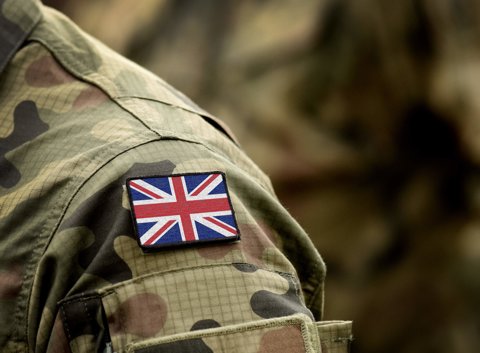
Gavin Hughes
Partner, Military Claims Solicitor
For a Free Claims Assessment, call our AFCS Solicitors and we will help you. Ask if we can deal with your claim on a No Win, No Fee basis.


The Armed Forces Compensation Scheme (AFCS) is there so you can claim compensation if you’ve been injured whilst serving in the Armed Forces. It’s a no-fault compensation scheme for anyone who has suffered an injury or illness on duty from 6 April 2005.
You can make a claim for compensation through the Courts, as well as making an AFCS claim. Any compensation awarded from the AFCS will be offset against the award the court makes.
Our specialist Military Claims Solicitors can help you to be clear about what you can claim and where you can make your claim.
Call us for a Free Claims Assessment. There’s no obligation to take it any further, so get in touch today.



If you’ve been injured or suffered an illness when serving in the British Armed Forces, you can make an AFCS claim. Your job is already dangerous, so it’s important that you can get the help you need if you become ill or injured.
The AFCS is a no-fault scheme, so the payment awarded does not depend on proving blame. Instead, you just need to show that you suffered an injury while in service, including combat and conflict situations.
As long as your accident or illness happened on or after 6 April 2005 and you submit your claim before the 7 year deadline, you can make an AFCS claim.
Simpson Millar5 stars
Superb from day one
Superb from day one. Always helpful and honest in there approach to everything. I was very nervous in the beginning but I was made to feel at ease with the exceptional way that I was treated. In parti...
ben marsh
Simpson Millar5 stars
11/10 from me absolutely superb
My claim has been handled from start to finish with both professionalism & compassion , Simpson Millar ( Jonathan Cloudsdale ) in particular has kept me up to date each step of the way to make this c...
Chris Fidoo
Simpson Millar4 stars
Overall I received very good service…
Overall I received a very good service from the company. Unfortunately the person dealing with my case left the company before the case was concluded. Thereby followed a protracted period of uncertain...
Martin Dawkins
Simpson Millar5 stars
What a team I could be any more…
What a team I could be any more grateful for all the hlep and everything they have done and they have went above and beyond for me I can't ask for better team of people thank you for the hlep and time...
Nicola Mcphee
Simpson Millar5 stars
Gavin Hughes
We meet Gavin Hughes through a mutual friend as I has a medical case which I wanted assistance with. From the moment we met Gavin we knew that he would be the right person for us. Gavin and the team a...
Roy
Simpson Millar5 stars
Excellent establishment
Excellent establishment, Great interaction throughout everything, Highly recommended.
Katie
Simpson Millar5 stars
Gavin Hughes highly recommended
I would highly recommend Simpson Millar and Gavin Hughes in particular, for anyone seeking legal advice for an injury claim. Gavin really does care a lot about his clients and is always there when you...
Shane Dawson
At Simpson Millar we want to help you. We are proud of our track record and the comments from our clients which is at the end of the day why we do the work we do.
Our experienced team of Military Claims Solicitors have supported many other serving personnel in making successful personal injury claims and AFCS claims.
There won’t be a hard sell – just clear, open and straightforward advice for you.
Because we have an office in Catterick, we support many serving personnel and their families and we can help you too.
Our specialist team are happy to offer you a Free Claims Assessment, where we can talk to you about making an AFCS claim, a Personal Injury Claim or both.
Contact one of our Military Claim Lawyers today for a free, no obligation conversation.
There is a strict time limit to make a claim through the AFCS. You have 7 years from the time you were injured or became ill to make an AFCS claim.
In general, claims must be lodged within seven years of the date of the incident, but there are some exceptions:
You can make a claim even if you are still serving in the Armed Forces – you don’t have to wait until you leave.
You just need to submit a claim form to Veterans UK, giving details about your illness or injury. You’ll need to also add in why you think it was caused by serving in the Armed Forces and what treatment you’ve had.
We can help you with submitting this application and use our wider knowledge to make sure your AFCS claim is successful.
As long as your accident or illness happened on or after 6 April 2005, and you are within the time limits, you can make a claim.
It doesn’t matter if you are still serving either – you can still make a claim.
There is a tariff table for each injury or illness. The amount of Armed Forces Compensation Scheme payout you get will depend on how serious your injury or illness is.
The ACFS tariff classes each injury from level 1 to 15 – with 15 being the most severe. You can see a list of injuries and tariffs on the Gov.UK website, but we’ll be happy to talk this through with you when you get in touch.
Yes you can. A civil claim may be a better option for you and this is something we can talk about in your free claims assessment. Civil claim compensation is usually higher than an AFCS award, because in any civil claim the MoD would be found responsible for your illness or injury.
You can’t be compensated twice for an injury or illness, so any award from AFCS will be credited against any compensation from a civil claim.
There are 2 types of awards in an AFCS claim. These payments are not made after a civil claim.
Your compensation is supposed to be paid out in 6 months, but we find it can usually take longer than that.
The more complex your illness or injury is, the longer it will take to get your compensation.

It’s been widely reported that a military officer with 26 years of service was the victim of derogatory and insulting remarks during a consultation with a civilian panel advising the Ministry of Defence on his Armed Forces Compensation Scheme (AFCS) claim.

While military personnel have been asked to follow Government guidance on social distancing, homeworking, and non-essential travel, a prolonged lockdown for Armed Forces personnel could prove challenging to a workforce used to a highly dynamic and active working environment.

A Non Freezing Cold injury can have serious long-term consequences, such as considerable pain and loss of dexterity in your fingers, which may in turn affect your future job prospects.PaperBiscuit438!
Fill in the form below to get in touch with one of our dedicated team members, or call our team today on: 0808 239 0244